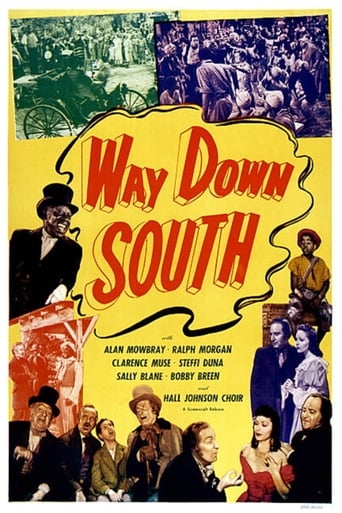mark.waltz
Handsomely presented, this "B" musical drama has boy soprano Bobby Breen as the wronged heir to the estate of a Southern Plantation owner whose attorney uses his power ruthlessly to change the happy slaves from singing "Oh, Dem Golden Slippers" to "Nobody Knows the Trouble I've Seen". Breen's father (Ralph Morgan, brother of Frank, the "Wizard"), had been making lots of money on his peanut plantation, so he felt he owed a lot to his hard working slaves, treating them more like servants. But after Morgan is accidentally killed in a tragic accident, the ruthless attorney (Edwin Maxwell) begins to beat and sell the slaves, something Morgan had made Breen promise he would never do. Breen disguises the black butler (Clarence Muse) as a veiled white woman, and they escape, utilizing the help of a kindly innkeeper (Alan Mowbray) and a Scarlet O'Hara like actress (Steffi Duna) to get back his birthright and right the wrongs so the slaves can pick peanuts happily ever after while singing their sunny spirituals.The Johnson Hall Choir is utilized to show the happiness and gloom of the large stable of slaves, and is performed beautifully. The obvious flaw of the film is the stereotypical manner of the black actors and singers, but the film is set in 1854 and was released in 1939, the same year as the epic Civil War drama of the sagging south, "Gone With the Wind". That somewhat justifies the structure, and there are more white people fighting for justice for Breen's slaves than evil ones. If the film is not entirely historically accurate, it more than makes it up in being pure entertainment, and Breen does a nice job after being a bit cloying in his earlier films.
Michael_Elliott
Way Down South (1939) ** 1/2 (out of 4) Interesting race picture from RKO features two black writers (Clarence Muse, Langston Hughes) doing the screenplay. Set before the Civil War, a plantation owner dies leaving his farm and slaves to his young son (Bobby Breen). Soon an executive comes into play and tries to sell the slaves but the young kid won't stand for this as the slaves are his only friends. It's interesting to see a Hollywood picture from this era treating blacks with any sort of respect and in many ways it's more respectful than many of the other race pictures that I've seen, which were made by black directors. The film only runs 61-minutes so the drama of slavery isn't ever really looked at and the film would later be criticized by the NAACP for showing "happy slaves". The films main goal is to have a spotlight for the young Breen and he's pretty good here, although his musical numbers aren't anything special.
boblipton
At times this movie is brilliant beyond my powers of description to note. At other times it turns stupid. Langston Hughes' poetry and powerful images dominate some scenes. At others we have the sight of Clarence Muse in a dress and veil, or Bobby Breen advancing the plot while Alan Mowbray does his best to make it interesting by a little judicious mugging. Even the musical numbers are erratically choreographed. The last may have been an attempt to either appease white audiences who would never see this movie or a choreographer utterly ignorant of jazz dancing. In 1939? It doesn't make sense. Perhaps it was shot, edited, tested and then someone else went back to do some ham-handed reshooting.The problems I have with the execution of this movie cannot be denied, but its strengths are likewise undeniable. Take a look at it and bear in mind that this was released in he same year as GONE WITH THE WIND.
ivan-22
I liked everything about this forgotten, unpretentious, good-natured, well-made film ahead of its time regarding "the race problem". It delivers far more solid good time than many a famous films. It's a thrill to see nothing but unknown actors, all of them good. Bobby Breen is also an exceedingly confident and accomplished singer.


